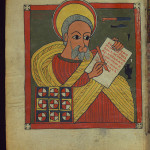We run our website the way we wished the whole internet worked: we provide high quality original content with no ads. We are funded solely by your direct support. Please consider supporting this project.

Why Does God’s Activity Seem So Arbitrary?
Why? It’s the question that never goes away. Why is one infant born sickly and deformed when at the same time another is born perfectly healthy? Why does tragedy repeatedly strike one family while another seems to enjoy uninterrupted peace? On and on we could go with examples. It all seems so arbitrary and unfair.
And this apparent arbitrariness carries over to the way God answers prayer. While most people who regularly pray tell of occasions when their prayers were miraculously answered, they also admit that there is no rhyme or reason as to why some prayers are answered and others aren’t.
We can appeal to the free will of humans and angels to explain why evil in general must be allowed. But this alone does not explain why any particular evil occurs. And it doesn’t explain God’s seemingly arbitrary involvement in the world. Why does God intervene to stop evil in one instance but not in another?
In trying to answer this question, I must confess that what I actually believe is that there can be no final explanation to this question. The arbitrariness of life is a mystery. Yet everything hangs on where we locate this arbitrariness and mystery. Everything hangs on what we think we can and can’t know.
We customarily assume we know a lot about creation but very little about God. After all, we can see creation, but we can’t see God. Creation is finite, but God is infinite. While we can explore creation, we can’t explore God. And since it’s usually assumed that God directly or indirectly controls everything that occurs in creation, we are inclined to attribute the arbitrariness of creation to his mysterious will.
I argue for the opposite view. Because of God’s self-revelation in Jesus Christ, we can be confident of our knowledge about God’s character and general purposes for our life. What we can hardly begin to fathom, however, is the vast complexity of creation, a creation that includes an untold number of human and spiritual free agents whose decisions affect much that comes to pass.
This is not at all to suggest that we know everything about God. To the contrary, there are aspects of God that are utterly beyond comprehension. But we can know what is most important to know, namely, that when we see Jesus Christ we see God. In Christ we confidently know God’s character and purposes. Therefore, when we observe that which is inconsistent with the character of God revealed in Jesus Christ, these things ultimately come from agents who oppose God.
However, we know next to nothing about how these agents’ wills affect what comes to pass.
Behind every particular event in history lies an impenetrably vast matrix of interlocking free decisions made by humans and angels. We experience life as largely arbitrary because we can’t fathom the causal chains that lie behind every particular event. In Christ, God’s character and purposes are not mysterious, but the vast complexity of causal chains is.
The mystery of evil and the question of “why”, therefore, is about an unfathomably complex and war-torn creation, not about God’s character and purpose in creation.
—Adapted from Is God to Blame?, pages 78-80
Photo credit: ignis via VisualHunt / CC BY-NC
Category: General
Tags: Character of God, Free Will, Jesus, Prayer, Problem of Evil
Related Reading

Are the Gospels Historical Fiction?
Some scholars today argue that the stories recorded in the Gospels are actually intentional fabrication. In essence, they argue that Mark took Paul’s theology and robed the story of Jesus in a fictitious historical narrative. The other Gospels followed suit. The argument is clever and removes the difficulty of explaining how a legend of a…

Podcast: Is God Fickle?
Is there anything at stake in our life? Greg balances God’s mercy and grace with the authenticity of free will. http://traffic.libsyn.com/askgregboyd/Episode_0255.mp3

So Much Evil. Why?
In light of the profound evil being experienced by the people of Paris and countless other locations around the world, we thought we would raise again the question that many ask when things like this occur: Why? Of course, Greg has spent much of his writing and speaking energy addressing this. Here is a basic,…

Part 4: An Alternative Cross-Centered Approach
Image by Karl Pang via Flickr As I mentioned in Part II of this review, I am deeply appreciative of the fact that Flood grasps the centrality of enemy-loving non-violence in Jesus’ revelation of God. And while many, if not most, of the depictions of Yahweh in the Old Testament are consistent with this revelation, I…

Podcast: Can We Really Have a Personal Relationship with Jesus?
It’s all about parts and wholes in this rip-roaring journey through the historical development of certain pietistic trends as Greg introduces his listeners to Depeche Mode Theology. http://traffic.libsyn.com/askgregboyd/Episode_0228.mp3

Do All Roads Lead to God?
First, if it’s really true that Jesus is the way to Father and that no one comes to the Father except through him, (Jn 14:6) then it seems that no other religious leader or religious doctrine can bring us to the Father. “The” is a definite article, and it implies singularity. “A dog” could refer…
